25+ Women in the Bible Who Teach Us About Patience, Strength and Faithfulness
While a few paragraphs in a single article cannot pay homage to the many women of God we read about in the holy scriptures, it's a wonderful starting place. Whether their mention is a handful of verses, a chapter or an entire book, whether they receive a mention by name or not, these women were faithful to what God asked of them. These women in the Bible are an inspiration to all of us—men and women alike.
Times, they were ancient. We can't fully comprehend what it was like to serve Yahweh in an Old Testament culture of regional, pagan gods. Turning to the New Testament, we're still learning how Jesus Christ's encounters with women gave them a new and greater identity than they had in their own day and time. What we can realize is how these women learned to trust in God—at times in the most impossible of circumstances—when it certainly seemed like the odds were stacked against them. Here are 25+ biblical women who have much to teach us about strength, perseverance and faith.
Related: You Can Start Small With Scripture Memorization—Here Are 75 of the Best Short Bible Verses
25+ Women in the Bible To Look Up To
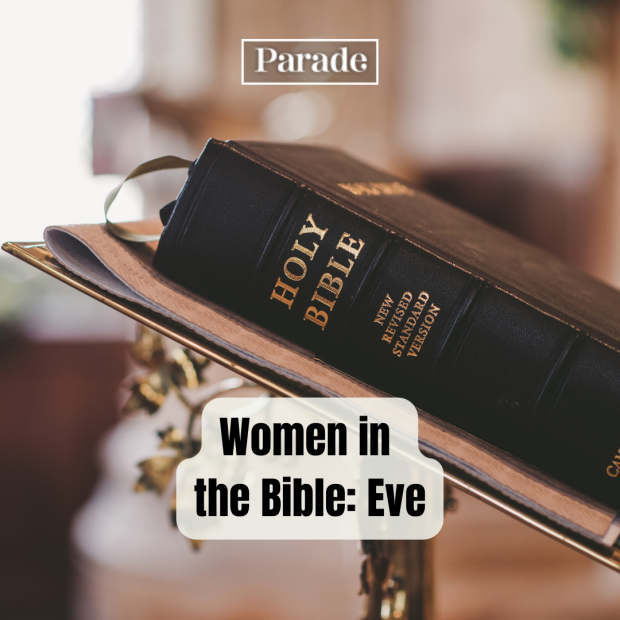
Canva/Parade
1. Eve
She's there in the beginning. In the earliest chapters of Genesis, we read about God creating her to be a companion for man. Together, Adam and Eve get themselves kicked out of the Garden of Eden. Then they suffer through the loss of Abel, and the exile of Cain. Eve gave birth to Abel, Cain, Seth, and other sons and daughters (Genesis 5).
And we're just five chapters into the Bible! When I read Eve's story, it leaves me tired. Every day must have felt new. She suffered enormous loss, but showed great resilience. I wonder how often she thought back to those early days in the garden, the face-to-face conversations with God before everything changed. Oh, to know that kind of intimacy with God. Doesn't the following verse have a familiarity to it, like this kind of thing happened all the time? "They heard the sound of the Lord God walking in the garden at the time of the evening breeze... among the trees of the garden" (Genesis 3:8).
2. Sarah
Along with her father-in-law, Terah, husband, Abraham, and nephew, Lot, Sarah moved far away from home. Twice. She was also one of several women who suffered from infertility in the Bible. After suggesting Abraham go to her handmaid, Hagar, Sarah turned pretty bitter about how things turned out. That is, until she was 90, when "God did for Sarah as he had promised" (Genesis 21:1) and she conceived a boy who Abraham named Isaac.
Sarah could speak to the idea that good things come to those who wait. She spent the last thirty years of her life enjoying her family, and is a matriarch of the people of God. Sarah, your descendants are as numerous as the stars.
3. Hagar
She has the honor of being the mother to Abraham's first-born son, Ishmael. Reading her story in Genesis 16, 17 and 21 will break a reader's heart. Did she have a voice in her circumstances at all? After Abraham took her and their son out into the wilderness for good, could she hear the sound of wild animals there? What must it have been like for her to watch her son dying of thirst?
With God's help, Hagar found a way to raise Ishmael into adulthood. We read that he grew up there in the wilderness, and his mother got him a wife from Egypt. How many times over the years did she think back to another time she spent in the wilderness, after running away from Sarah? The time the angel of the Lord found her, assuring her that her offspring would be great, and she knew God to be El-roi, the God of seeing (Genesis 16:13).
4. Rebekah
When their son was old enough to take a wife, Abraham made his servant promise he wouldn't get a wife for Isaac from the Canaanite women. He wanted a young maiden from his own kin. So, the servant back home, and he returned with Rebekah, who had shown him great kindness. However, she also turned out to be a crafty one, a trait she likely learned from her brother, Laban, and passed on to her son. Isaac repeated a lot of his father's mistakes, but he and Rebekah did manage to start a family (after she was barren for a time)—twin boys, Esau and Jacob.
For all intents and purposes, it would appear they played favorites with their boys. Although a word from the Lord at their birth might have had something to do with that (see Genesis 25:23). She had trouble with Esau and his wife (Genesis 26:35) and ended up sending Jacob away to get a wife from their relatives (thus getting him away from Esau because plenty of animosity existed between the two brothers by this point). In the end, though, because of Rebekah's faithful life, she mothered great nations.
5. Rachel
For the fourteen-plus years Jacob was in Haran, he took on two wives who were sisters. In all, he would father twelve sons and one daughter, with the two wives and their servants. Life in the Jacob-Leah-Rachel household was a lot. Throw in a move back to Canaan, where Rachel died giving birth to Jacob's last son, Benjamin.
She was buried there, still some distance from "Ephrath, (that is, Bethlehem)" (Genesis 35:19). Thousands visit her tomb still today. Perhaps her greatest legacy, what we can especially admire Rachel for, is the gift of her son, Joseph. After suffering from years of infertility herself, Joseph was her firstborn. It was Joseph who would save the Israelite people from starving to death when there was a great famine in the land.
6. Leah
The other half of the sister combo married to Jacob. Although she gave Jacob many sons and a daughter, the Bible makes it clear she wasn't loved by Jacob in the same way he loved Rachel. How that must have devastated her.
You can trace Leah's emotional journey through the names she selected for her four sons. From Reuben (See, A Son), to Simeon (He who hears), to Levi (attached to each other) to Judah (Now I will praise the Lord), the life of Leah teaches us we may not always receive the favor of man, but the Lord always looks on us with favor. He alone is praiseworthy.
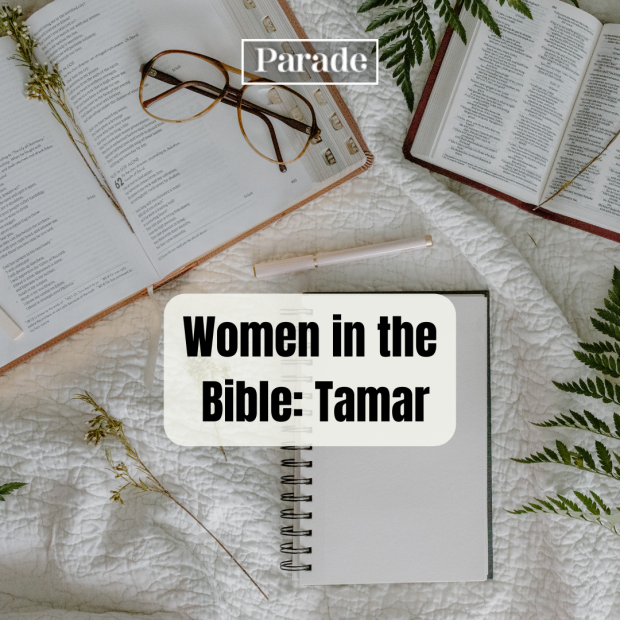
Canva/Parade
7. Tamar
There are a few chapters toward the end of Genesis that focus on Judah, who is Jacob's fourth son. One verse in the ancestry of Jesus, found in Matthew 1 shed light on this time in patriarchal history: "Judah the father of Perez and Zerah by Tamar, and Perez the father of Hezron, and Hezron the father of Aram" (Matthew 1:3).
We're sometimes quick to glance over these lists of names in the Bible, but don't skip over Tamar. You can read her story in Genesis 38, but be warned, it is not an easy one. Tamar laid claim to her rights by Levirite law, and the Abrahamic line was blessed again with twins. A bold story of throwing caution to the wind. That Matthew would know the details of this ancient story, and be guided to include Tamar in his genealogy of Jesus, might just have surprised him too.
Related: 25 Bible Verses About Hope
8. Miriam
Two images of Miriam show her to be a woman of leadership and strength. First, when her brother, Moses, was put in the Nile River, hidden away from those who would carry out the Pharaoh's edict to kill all Hebrew baby boys, Miriam stood nearby. When the baby in a basket was discovered by the Pharaoh's daughter, Miriam showed great bravery and wisdom, offering to find a Hebrew woman to nurse him (Exodus 2).
The second instance happened years later, along the shoreline of the Red Sea (Exodus 15). In a poetic rendition of the earliest days of the Exodus, the Lord had just brought the Israelites through the Red Sea unharmed, while Pharaoh's men and horses were drowned in the sea. "Then the prophet Miriam, Aaron's sister, took a tambourine in her hand; and all the women went out after her with tambourines and with dancing" (Exodus 15:20).
9. Rahab
Here we have another one of the women listed in the genealogy of Jesus in Matthew 1. The Israelites have made it out of Egypt, and through the wilderness, and are in the Promised Land. Specifically, Jericho. Without knowing the full context of the culture of the times, the second chapter of Joshua tells us Rahab was a prostitute.
Rahab assists the Israelite men who were sent to spy out the land. She lived on the walls of Jericho and helped them escape after they'd found out what they needed to know. Later, they spared her and her family before destroying the city. Why? Here's what Rahab knew to be true: "The Lord your God is indeed God in heaven above and on earth below" (Joshua 2:11b).
10. Deborah
In the midst of the chaos we read about in the book of Judges, there are two heroic women who emerge victorious over their enemies. Deborah has credentials; prophetess, wife and judge (think chieftain, not court-of-law judge). She led Barak and thousands of Israelite warriors into battle against King Jabin, a Canaanite king. They were victorious (see Judges 5). This led to the very best news we can read in Judges: "And the land had rest forty years" (Judges 5:31b).
11. Jael
No story about Deborah, and certainly no story about Barak, would be complete without including Jael. When Barak requested Deborah's assistance in battle, she said, "I will surely go with you; nevertheless, the road on which you are going will not lead to your glory, for the Lord will deliver Sisera [general of King Jabin's army] into the hand of a woman" (Joshua 4:9a).
When Sisera showed up at Jael's doorstep, she invited him in. She covered him with a rug, gave him a drink, and he fell asleep. It was then she took a tent peg, grabbed a hammer, and drove the peg into his temple. The woman who did what she had to do—you don't mess around with Jael.
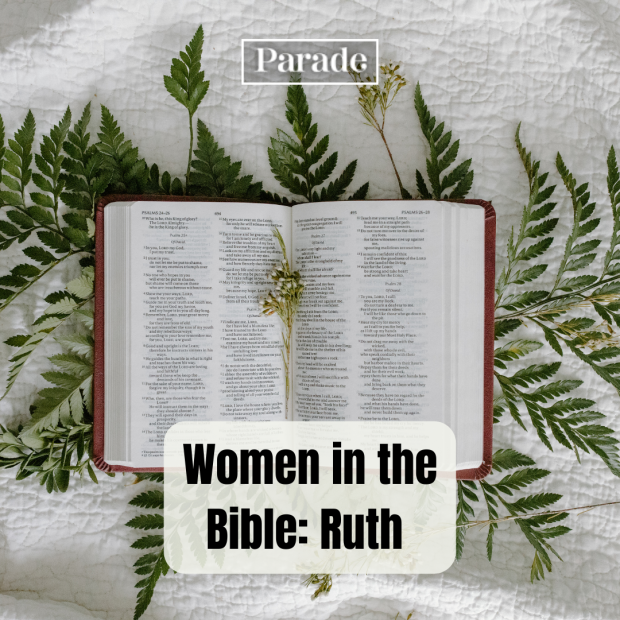
Canva/Parade
12. Ruth
At the end of the biblical period known as "Judges," similar to the concept of a chieftain, we have the book of Ruth. She's one of two women to have an entire book in the Bible. In the opening chapters of Ruth, we read about how hard life has been for a Jewish woman named Naomi up to that point. Along with her husband and their two sons, they left Bethlehem due to a famine. They settled into this foreign land, and the sons both found wives. First, the husband, and years later the sons, died.
What choice does Naomi have but to return home? In a rather moving scene, one daughter-in-law, Orpah, chooses to return to her own family, while Ruth proclaims: "Where you go, I will go; where you lodge, I will lodge; your people shall be my people, and your God my God" (Ruth 1:16). She never waivers in that commitment. It brings healing and provision in both her own life, and in the life of Naomi. Ruth, too, has the honor of being named in the genealogy of Jesus, which we find in Matthew 1.
13. Hannah
This devoted woman joined the group of biblical women who suffered from a barren womb. In the opening chapters of I Samuel (slight spoiler alert, the book is so named after her son), we find Hannah crying out to God in the Tabernacle at Shiloh. She knew the best place to take her tears were to the Lord. The priest, Eli, saw how upset she was, and took her to be drunk. Not so!
In 1 Samuel 1:20, we read that "in due time" (read in God's time), Hannah had not only a son named Samuel, but other children as well. As she had promised God, she gave Samuel back to him for a lifetime of service. Such a picture of trust and devotion!
14. Bathsheba
By the time we read about Bathsheba, we've made our way into the era of kings. Although he already had wives, King David decided he wanted Bathsheba too. There's plenty of debate about how much control, if any, Bathsheba had in this decision that upended her life. There's much to this story we do not know, but Bathsheba shows great resolve and strength throughout.
From the days of losing her first husband, moving into the king's household, mourning the death of her infant child, and raising Israel's next king, Bathsheba endures. She is the final Old Testament woman mentioned in the genealogy of Jesus, referenced there simply as "Uriah's wife." Except there's nothing simple about that.
15. Proverbs 31 Woman
Judaism has given us a tremendous gift in their handling of this epic poem about an anonymous woman we can certainly look up to. If we take each task, "brings her food from far away," "her lamp does not go out at night" and "makes herself coverings," for example, modern-day women are left with a to-do list that feels impossible. Is impossible.
Jewish families traditionally have sung this final section of Proverbs over the women in the household on Friday evenings, at the beginning of Shabbat. It's an ode to women, metaphorical at every turn. According to an article in MyJewishLearning, "A woman who knows when to be fluid and when to be firm, when to exercise lovingkindness and when to establish boundaries, and who recognizes those rare occasions when it’s proper to exhibit both is a woman whose mouth speaks wisdom, whose children celebrate her, and who laughs into age old." In Hebrew, Eschet Chayil is "woman of valor."
16. Huldah
One of the many joys of studying the Bible fervently is the discovery of women (and men) who we might not have learned about in Sunday School. They're the faithful who are tucked away in obscure passages, in lesser-read books like Chronicles, for example. That's where we find the prophetess Huldah.
In the long line of Old Testament kings, we read about good kings, bad kings and kings who were a little of both. King Josiah, for example, began his reign at eight years old! At a time when the southern kingdom desperately needed reform, the king was reintroduced to the words of the law. He realized how far away from God the people were. He sent some of his men to Huldah, who lived in Jerusalem. She was doing the work God had for her to do. When asked, she delivered the word of the Lord, full of bad news and good news. What a faithful servant.
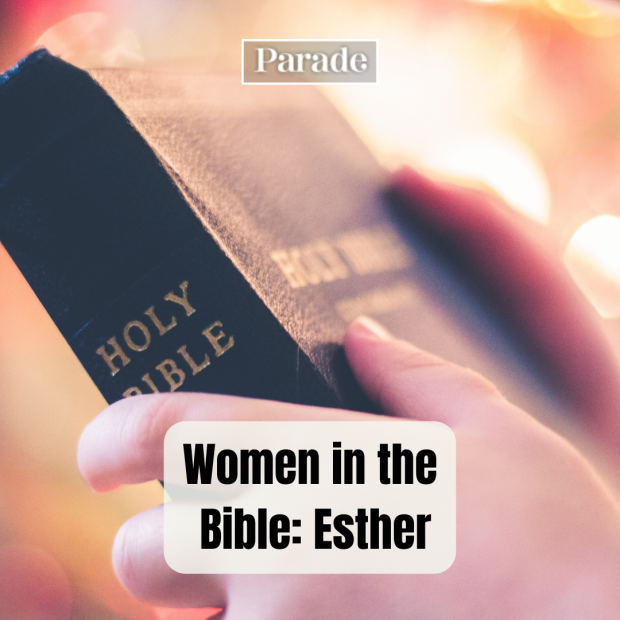
Canva/Parade
17. Esther
Along with Ruth, Queen Esther has her own book in the canon of scripture. Her story takes place toward the end of the Old Testament, although we find the book itself located earlier on among the historical books of the Bible. The Hebrew people have been scattered, and Esther is living in Persia. Through a rather unfortunate series of events, King Ahasuerus finds himself looking for a new queen. At the bidding of her relative, Mordecai, Esther agreed to join the other women vying for the king's approval.
She did win the king's favor, becoming the next queen, which ended up being a life-saving maneuver, as the people of God found themselves under attack from the evil Haman, an Agagite (indicating this feud went way back in history). Queen Esther was called upon to speak up on behalf of her people, although for her it could mean her own death. Asking the Jews to fast (which indicates a time of intense prayer and seeking of the Lord) on her behalf, the actions of Esther did, in fact, save her people.
18. Elizabeth
At the beginning of the New Testament narrative, the gospel writer, Luke, introduces us to Elizabeth, and her husband, Zechariah, who is a priest. The couple was struggling with infertility, until, in her old age, an angel of the Lord appeared to Zechariah while he was serving in the Temple, and told him they would have a son, who was to be named John.
Their son would become John the Baptist, the forerunner for the Messiah, Jesus Christ. Consider it a great gift bestowed on Elizabeth that her relative, Mary, came to visit her when she found herself with child. Further down in the first chapter of Luke, we read about the greeting between these two women upon Mary's arrival. "When Elizabeth heard Mary's greeting, the child leaped in her womb. And Elizabeth was filled with the Holy Spirit and exclaimed with a loud cry, 'Blessed are you among women, and blessed is the fruit of your womb'" (Luke 1:41-42).
19. Mary, the Mother of Jesus
There is no one we can look up to more than Mary, the mother of Jesus. Her humble yes, "Here am I, the servant of the Lord; let it be with me according to your word" (Luke 1:38). Her song, the Magnificat, where she shared her belief in a God who would do everything he promised, and she was blessed for it.
And Mary said, 'My soul magnifies the Lord, and my spirit rejoices in God my Savior, for he has looked with favor on the lowliness of his servant. Surely, from now on all generations will call me blessed.'" Luke 1:46-48
Related: 45 Bible Verses About Helping Others
20. Martha (and Mary)
Friends of Jesus. We look up to them for that alone. In the notable story of the two sisters at their house when Jesus came to visit (Luke 10:38-42), We can admire Martha for her heart of service. When one's heart is in the right place, we so need people willing to take action. We can admire Mary for her contemplative nature, for having the privilege of literally sitting at the feet of Jesus. Can you imagine?
They walked through grief with Jesus too, at the death of their brother Lazarus, and later at the crucifixion. Being companions in grief is a deep connection that surely only heightened their love of our Lord.
21. The Women of Luke 8
It's but a mention, but imagining the context shows this faithful throng of women who gave up whatever it was they had to do, so they could follow Jesus.
"Soon afterward he went on through cities and villages, proclaiming and bringing the good news of the kingdom of God. The twelve were with him, as well as some women who had been cured of evil spirits and infirmities; Mary, called Magdalene, from whom seven demons had gone out, and Joanna, the wife of Herod's steward Chuza, and Susanna, and many others, who provided for them out of their resources" (Luke 8:1-3).
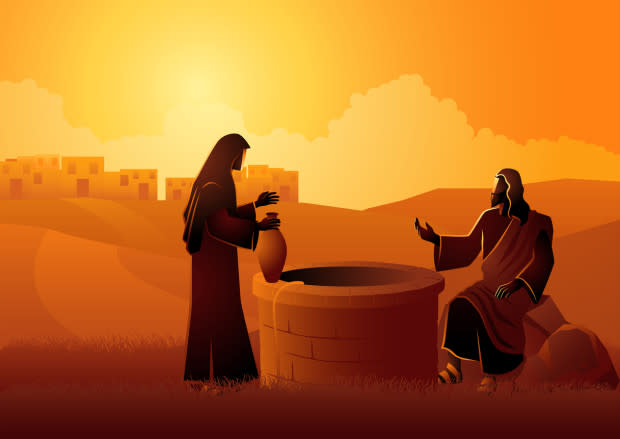
iStock
22. The Woman at the Well
Tradition gives her the name, Photini. The gospel of John calls her simply, the Samaritan at the well. For lots of reasons, she wasn't someone Jesus should be talking to alone. He always seemed to be setting aside cultural expectations to make real connections with people. They talked about religion, a history of two people groups and living water.
She believed him, and in those early moments of belief, she knew her life could be different. She knew this encounter with Jesus would change her forever. And she went, and she told everyone in her city. "Come and see a man who told me everything I have ever done! He cannot be the Messiah, can he?" (John 4:29).
23. The Woman Who Bled for Twelve Years
Tradition gives her the name Veronica, and there are some beautiful stories told about her presence on the Via Dolorosa. In scripture, we read about her in the eighth chapter of Luke. She'd been bleeding for twelve years, and no amount of money or physician's visits had helped. She came to Jesus out of desperation.
All she did was touch the fringe of his clothes, and she was completely healed. What kind of healing power occurs just from a simple touch? Jesus knew it too. Without her identifying herself, he knew power had left his body. He looked for her. Upon finding her, she's the only woman in the Bible whom Jesus called, "Daughter."
24. The Women at the Cross
There at the crucifixion. They would not lead their Lord to suffer alone. Such devotion, no matter what it cost.
"Meanwhile, standing near the cross of Jesus were his mother, and his mother's sister, Mary the wife of Clopas, and Mary Magdalene." John 19:25
25. The Women at the Tomb
There at the tomb to ensure Jesus had a proper burial. Perhaps they had no idea how to let him go. There at the empty tomb, witnesses of the resurrection. Hallelujah.
"The women who had come with him from Galilee followed, and they saw the tomb and how his body was laid. Then they returned, and prepared spices and ointments... But on the first day of the week, at early dawn, they came to the tomb, taking the spices that they had prepared. They found the stone rolled away from the tomb, but when they went in, they did not find the body." Luke 23:55-56a, 24:1-3
26. Phoebe
Paul introduces us to Phoebe in the final chapter of Romans. It would seem she delivered the letter to the Romans, possibly instructing the recipients on the contents and meaning of the hefty teachings in the letter. Paul identified her as a deacon as well as a benefactor to many—including himself.
We're learning more all the time about the women of the early church, and the various roles they held. Phoebe's position (and Christian character) was definitely one of respect and authority.
27. Junia
In the same chapter, Romans 16, amidst the names of other women we can learn more about someday, we find Junia. She'd been a Christ follower longer than Paul and, apparently, she and Andronicus, her companion, were fellow Jews who'd been in prison with Paul at some point. The phrase that lingers, so poignant, is this: "They are prominent among the apostles" (Romans 16:7).
Up Next: How To Start Bible Journaling